► The most luxury cars you can buy
► Ranked by CAR
► From Goodwood to Ingolstadt
While all the best cars have at least some focus on passenger and driver comfort – the best luxury cars do so as their primary passion. In addition to the most high-tech gadgets, to the best legroom and a ride that should feel like a magic carpet, the best luxury cars also offer more customisation than a humble options list: in this sector, particularly its upper echelons, you can have any colour, upholstery or accessories you desire.
The best luxury cars at a glance:
- Best for convertible luxury: Aston Martin DB12 Volante – Find out more
- Best for the most of everything in a saloon: Rolls-Royce Phantom – Find out more
- Best for electric class: Porsche Taycan – Find out more
Luxury comes in many shapes and sizes, from posh superminis to super-SUVs. For the purposes of this page, we’ve concentrated on traditional luxury cars for the most part, with one or two notable exceptions.
As for ride and driving dynamics? Not so long ago, such machines handled like lifeboats on a stormy sea, but clever chassis technology has changed all that. Now you can switch from calm to combative at the click of a switch.
Best luxury cars 2024: a buying guide
Rolls-Royce Phantom Series II
Best for those seeking the ultimate in automotive luxury and comfort
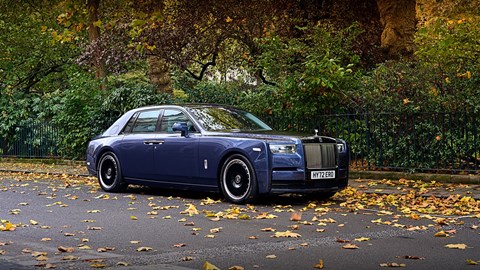
Pros: Unmatched luxury and personalization
Cons: You’ll need to go bespoke for the full experience
The Rolls-Royce Phantom Series II is excess in every way – and that includes its starting price of over £400,000. First, it’s powered by a 6.75-litre twin-turbo V12 engine producing 563bhp and 664lb ft of torque. That power is all about effortlessness rather than performance though; the horses are used here to deliver a smooth, commanding driving experience with advanced features like all-wheel steering and adaptive air suspension.
Although you’ll find cars from Bentley and Mercedes on this list, we think the Phantom stands out for its extreme opulence. It’s designed for luxury and comfort, with a focus on customization, allowing owners to personalize everything from colour combinations to interior materials. The rear passenger area is more like a lounge than a car, for example.
Read the full review of the Rolls-Royce Phantom here
BMW 7-Series
Best for those seeking luxury with a hint of sporty dynamics
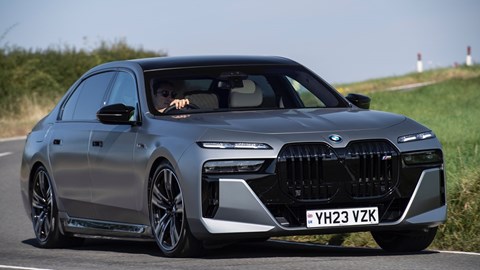
Pros: Luxurious interior and advanced tech, as you’d expect from a Seven
Cons: Maybe a little less comfort compared to rivals
The BMW 7 Series M760e (to use its full name) features a 3.0-liter six-cylinder turbo petrol engine paired with an electric motor, generating a combined 563bhp and 590lb ft of torque. BMW’s flagship isn’t small, but that’s enough hybrid power to get it from 0-62mph in a spritely 4.3 seconds. And there’s also an electric range of 35-40 miles and thanks to its 18.7kWh battery. If you’re using that EV-only range in town, you’ll also appreciate the rear-wheel steering, and numerous driver aids.
Compared to rivals like the Mercedes S-Class and Audi A8, it gives you better driving dynamics but slightly less comfort for passengers. It may not be the last word in comfort, but it makes every journey pleasurable for the driver whilst managing surprisingly good fuel economy.
Read the full BMW 7-Series review here
Mercedes-Benz S-class
Best for luxury seekers after that classic ‘Big Merc’ feel
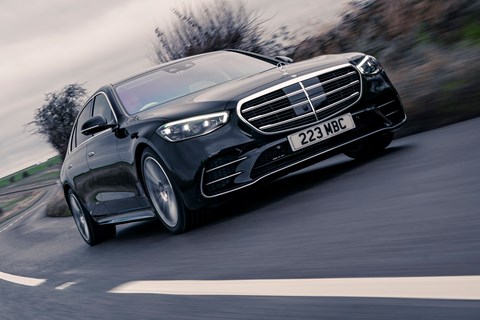
Pros: Outstanding electric range and advanced tech features
Cons: Inconsistent brake feel
It’s another hybrid! The Mercedes-Benz S580e L hybrid combines a 3.0-liter straight-six petrol engine with a 28.6kWh battery, delivering a combined output of 510bhp and 553lb ft of torque. That makes it no slouch to 62mph, but also means it boasts a 62-mile electric-only range and an impressive fuel economy of up to 353.1mpg.
But it’s not just about economy, of course: The S580e offers a smooth, near-silent ride while the interior gets advanced tech like biometric access and a sophisticated voice assistant. Because who needs buttons?
Now for the catches: Mercedes engineers didn’t quite hook up the feel of the regenerative brakes, and they can often feel a little inconsistent.
For more details, visit the full review on CAR Magazine.
Rolls-Royce Cullinan Black Badge (Series I)
Best for those who want mobile members’ club
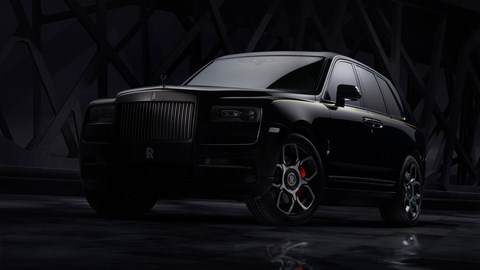
Pros: The most of everything – even more so than the Phantom
Cons: Heavy and less agile – if that matters to you
The Rolls-Royce Cullinan Black Badge is many ways the epitome of a luxury car – even if it happens to be an SUV. The engineers at Goodwood (and Munich) have stuffed a 6.75-liter twin-turbo V12 engine under the hood delivering 592bhp and 663lb ft of torque. And that means 0-62mph happens in just 5.2 seconds.
We’ve chosen the Black Badge here because it’s a little more driver-focused, but both models’ go above and beyond for all passengers. The interior offers unparalleled luxury with high-end materials, and there’s also a riff on BMW’s iDrive system. It’s also a bit more practical than the Phantom, and more useful when you’re driving through the muddy bits of your country estate.
We’ll be reviewing the new Series II replacement to this as soon as possible. You can read the review of the current car now, though.
Aston Martin DB12 Volante
Best for drivers seeking a high-performance, luxurious convertible
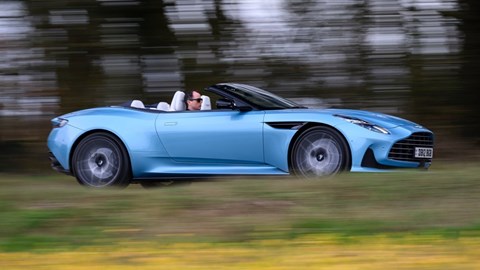
Pros: Luxurious ride and impressive performance
Cons: Feels large on narrow roads
There’s something special about riding in comfort while exposed to the elements – so we had to slot the Volante in here somewhere, The Aston Martin DB12 Volante is powered by a 4.0-liter twin-turbo V8 engine from the folks at AMG, and it’s good for 671bhp and 590lb ft of torque. That means 0-62mph in 3.7 seconds and a top speed of 202mph. There are new adaptive dampers and a more rigid platform too, so it’s quick around corners.
However, the redesigned interior with in-house infotainment makes this very luxurious too. If you want a dynamic yet comfortable driving experience with good road feel and minimal body roll – as well as open-topped luxury – this should be on your list.
Read our full Aston Martin DB12 Volante review here
Bentley Flying Spur Hybrid
Best for ultra-luxury travellers vaguely interested in mpg
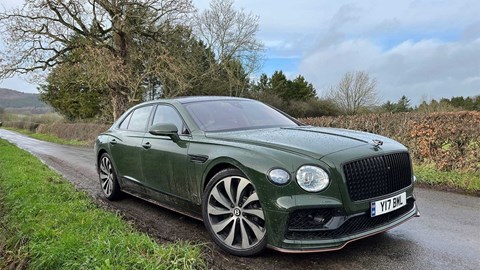
Pros: Luxurious ride and craftsmanship
Cons: Limited boot space
Bentley and Rolls-Royce are two the heaviest hitters in the luxury world, and the Flying Spur represents the formers’ ultimate saloon. Engineers in Crewe have taken the hybrid route, so the Flying Spur combines a 2.9-liter twin-turbo V6 engine with an electric motor, producing 536bhp and 553lb ft of torque. Its 18kWh battery provides a 25-mile electric range too.
In comparison to rivals like the Mercedes S-Class and BMW 7 Series hybrids, the Flying Spur stands out for its craftsmanship and luxury, though it falls a little short in electric range and practicality. Worst still, the V6 under the bonnet can sound strained when under higher levels of load. How uncouth!
Read the full review of the Bentley Flying Spur Hybrid here.
Bentley Bentayga Extended Wheelbase
Best for those seeking ultimate luxury in a large SUV
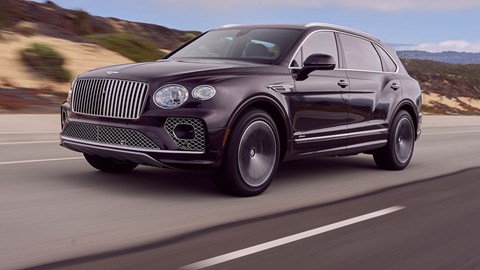
Pros: Luxurious ride and advanced rear-seat comfort
Cons: Increased weight affects agility
Rolls-Royce has the Cullinan, Bentley has this; the Bentayga Extended Wheelbase for extra space. As you’d expect, it features the 4.0-liter twin-turbo V8 engine with 542bhp and 568lb ft of torque, accelerating from 0-62mph in 4.6 seconds. The EWB is more luxurious than the rest; it adds 180mm to the wheelbase, enhancing rear-seat comfort with optional airline-style seats that recline up to 40 degrees.
The driving experience as wafty as you’d expect, but Crewe has focused entirely on luxury here. Take a look at the interior and you’ll see it’s a case of mission accomplished.
Read the full Bentley Bentayga EWB review here
Porsche Taycan Cross Turismo
Best for people who want a high-performance, all-electric luxury vehicle
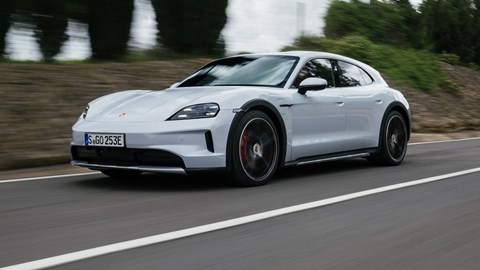
Pros: Enhanced performance and range, advanced driving dynamics
Cons: Braking inconsistency
Porsche’s Cross Turismo 4S model gets 590bhp on overboost, boasts a 0-62mph time of 3.8 seconds and up to 381 miles of electric range. There’s also Porsche Active Ride providing exceptional ride comfort. The only issue on the performance side is braking consistency, which has always been an issue with Stuttgart’s EVs.
We’ll be honest, the Taycan doesn’t scale the heights achieved by Goodwood or Crewe in the interior, but it still packs in a high level of technology and comfort. You get large touchscreens inside, a dynamic but comfortable driving position and near silent driving.
Read our full review of the Porsche Taycan Cross Turismo